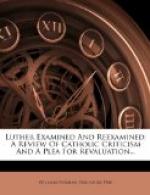It is a gratuitous criticism to say that Christians must not revile when they are reviled. Those who think that Luther did not know this rule of the Christian religion, or did not apply it to himself, do not know the full story of his life. He certainly did wrestle with the flesh and blood in himself. He sighed for peace, but the moment he seemed to become conciliatory and pacific, his enemies set up a shout that he was vanquished. It seemed that they could not be made to comprehend the issues confronting them unless they were blown in upon them on the wings of a hurricane. As early as 1520 Luther replies to an anxious letter of Spalatin, who thought that Luther had used too strong language against the Bishop of Meissen, as follows: “Good God! how excited you are, my Spalatin! You seem even more stirred up than I and the others. Do you not see that my patience in not replying to Emser’s and Eck’s five or six wagonloads of curses is the sole reason why the framers of this document have dared to attack me with such silly and ridiculous nonsense? For you know how little I cared that my sermon at Leipzig was condemned and suppressed by a public edict; how I despised suspicion, infamy, injury, hatred. Must these audacious persons even be permitted to add to these follies scandalous pamphlets crammed full of falsehoods and blasphemies against Gospel-truth? Do you forbid even to bark at these wolves? The Lord is my witness how I restrained myself lest I should not treat with reverence this accursed and most impotent document issued in the bishop’s name. Otherwise I should have said things those heads ought to hear, and I will yet, when they acknowledge their authorship by beginning to defend themselves. I beg, if you think rightly of the Gospel, do not imagine its cause can be accomplished without tumult, scandal, and sedition. Out of the sword you cannot make a feather, nor out of war, peace. The Word of God is a sword, war, ruin, destruction, poison, and, as Amos says, it meets the children of Ephraim like a bear in the way and a lioness in the woods.—I cannot deny that I have been more vehement than is seemly. But since they knew this, they ought not to have stirred up the dog. How difficult it is to temper one’s passions and one’s pen you can judge even from your own case. This is the reason I have always disliked to engage in public controversy; but the more I dislike it, the more I am involved against my will, and that only by the most atrocious slanders brought against me and the Word of God. If I were not carried away thereby either in temper or pen, even a heart of stone would be moved by the indignity of the thing to take up arms; and how much more I, who am both passionate and possessed of a pen not altogether blunt! By these monstrosities I am driven beyond modesty and decorum. At the same time, I wonder where this new religion came from, that whatever you say against an adversary is slander. What do you think of Christ?




